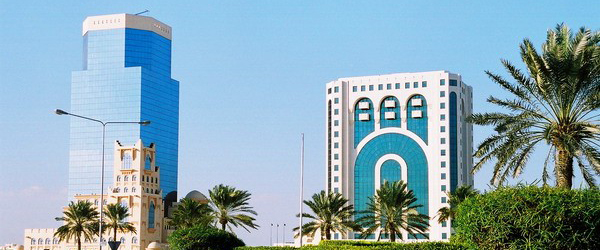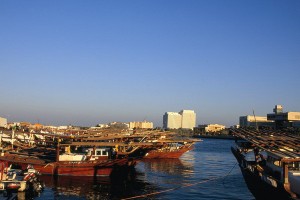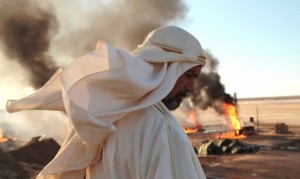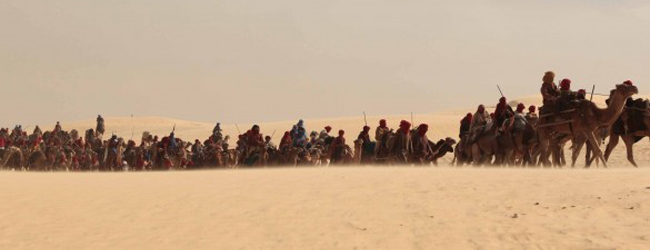Sand, sea and Black Gold - Qatar as a filming location
Producers looking for innovative new sources of film funding could do a lot worse than look eastwards to Doha in Qatar. That’s exactly what veteran director Jean-Jacques Annaud did for the USD55 million movie Black Gold.Located on the Persian Gulf, Doha is Qatar's largest city with over 80% of the nation's one million residents living in the city itself. It is fast becoming a substantial economic centre in the Middle East that's already punching well above its weight.
People like coming to shoot here, particularly for commercial car shoots and anything else that involves beaches and deserts.
Doha’s forward-thinking attitude is evident in the 14 sq km ‘Education City’, which hosts branch campuses of Cornell, Georgetown, Northwestern and Carnegie Mellon Universities, as well as an outpost of University College London. In an audacious bid, Doha also won the right to host part of the 2022 FIFA World Cup, which will bring the eyes of the world to the region.
Now Doha wants to make a name for itself as a location for filming and the new Doha Film Institute (DFI) has set to work attracting high-class work in the hope that others will follow.
Karen Coetzee, an Executive Producer at Central Films, one of the top production companies in Dubai, has spent a fair bit of time in Doha recently and is enthusiastic about what Producers can achieve:
“People like coming to shoot here, particularly for commercial car shoots and anything else that involves beaches and deserts. The city is clean and new, the buildings are really bright and bold. It very much has the old and new contrasts that give you a great mix of cultures and moods. The city is really picking up. It has some interesting developments and is really easy to get around. Plus, the beaches are only about 40 minutes from the city.”
 Karen explains the coastline is incredibly beautiful and uninhabited, while the desert sand is the kind of fine-grained white that can translate into tropical locations with ease. However, she is unsure how much scope there is at the moment for cheating other locations:
Karen explains the coastline is incredibly beautiful and uninhabited, while the desert sand is the kind of fine-grained white that can translate into tropical locations with ease. However, she is unsure how much scope there is at the moment for cheating other locations:
“To be honest it's pretty much what you see is what you get. Doha is one of the richest places in the world, but it is very small. You can easily do deserts, coastline and fantastic cityscapes, but you can't replicate Europe, for example. It is very much a developing Arab country and it’s true to say that Qatar is still in its infancy with film production. It is firmly on the agenda though and the Qataris are putting lots of initiatives in place to bring more feature film production to the country.”
 The DFI has set its cards on the table very quickly by getting behind the now annual Doha Tribeca Film Festival, which will expand quickly in its third incarnation in 2011. The festival aims to highlight the best of Arab filmmaking on a world stage and last year showcased 51 films from 35 countries including various world premieres, as Majid Wasi, Communications Chief at the DFI, explains:
The DFI has set its cards on the table very quickly by getting behind the now annual Doha Tribeca Film Festival, which will expand quickly in its third incarnation in 2011. The festival aims to highlight the best of Arab filmmaking on a world stage and last year showcased 51 films from 35 countries including various world premieres, as Majid Wasi, Communications Chief at the DFI, explains:
“In 2010 we financed four regional films - Hawi, Man Without a Cellphone, Grandma A Thousand Times and The Mountain - and are co-producing Director Jean-Jacques Annaud's USD55 million Arabian epic Black Gold, alongside Tarak Ben Ammar's Quinta Communications. We will support filmmakers in their storytelling, unlock creativity, connect regional and international talent, and create a credible and sustainable film financing model that benefits the whole of Qatar.”
A large part of the attraction of the DFI is that they are making financing available across any stage of the filmmaking process, with no restrictions on the story, genre, length or overall budget. Majid continues:
“We are working towards developing a sustainable film financing model in the Middle East, whilst maintaining complete credibility, providing established and emerging filmmakers an opportunity to showcase their talent to the global community. Right now we are building a skilled labour force in Qatar. Eventually, these early investments will lead to a thriving film and television industry that will serve as a resource to MENA countries and beyond.”
As we go to press, Black Gold is in the spectacular desert dunes at Mesaieed in Qatar, where all the battle scenes will be shot.
One Director who has seen beyond all this development and seized his opportunities early was Jean-Jacques Annaud (The Name of the Rose, Seven Years in Tibet, Enemy At The Gates) who adapted the 1957 Han Reusch novel The Great Thirst as Black Gold, using both Tunisia and Doha’s surrounding desert as the main locations. The film wrapped in Tunisia in January on-budget and on-schedule despite the final few days of filming taking place against the unfolding Jasmin Revolution in Tunisia.
 As we go to press, the film is being shot in the spectacular desert dunes at Mesaieed in Qatar, where all the battle scenes will be shot.
As we go to press, the film is being shot in the spectacular desert dunes at Mesaieed in Qatar, where all the battle scenes will be shot.
The drama is about the rivalry between two Emirs in Arabia in the 1930s just as oil is being discovered, and the rise of a young dynamic leader who unites the various tribes of the desert kingdoms.
Quinta Communications’ Tarak Ben Ammar explains:
“We are filming in Qatar in some of the world’s most stunning desert landscapes and that will help Black Gold look even more spectacular. Also, filming in Qatar gives me the opportunity to support and encourage the DFI's vision of building a sustainable film infrastructure in the country.”
Amanda Palmer, Executive Director of the DFI said:
“This large-scale production is a challenging and ambitious start for DFI's co-production, but this film will give us the experience and know-how to build the beginnings of a dynamic film industry in Qatar. We're honoured to work alongside Director Jean Jacques Annaud. Not only does he possess the right sensibilities to tell this beautiful Arab story, but he also understands the importance of teaching Qatari nationals and residents about film production. He has integrated a Qatari-based team into his staff to teach them on location about filming in their country and filmmaking in general. We're mobilising a whole country behind this film to establish Qatar as a global film hub."
The DFI, Palmer added, is being inspired by emerging industries in Romania, Tunisia and New Zealand, which began with international co-productions and are now confident to produce their own work for the global markets.
Black Gold is being earmarked for a Christmas 2011 release and already Warner Bros has signed on to distribute the film in France, the UK, Latin America and the Middle East. If it is a hit it should give Doha a further dose of global publicity and perhaps make producers around the world think seriously about contacting the DFI to talk about funding, as they are committed to funding ten Middle East films per year, and international movies on a case by case basis, for the foreseeable future.
Related Posts
- Film starring Antonio Banderas and Freida Pinto shoots 2nd unit on location in Qatar
- On location in Tunisia with local Line Producer Philippa Day
- Filming on location with the Mexico City Film Commission
- DFI-funded The Reluctant Fundamentalist filming on location across the globe
- High-end TV: How the small screen became big business
- Commercial country: Brazil welcomes the World Cup’s global spotlight
- On location with Michael Brook, Manager of Screen Auckland
- Middle East dramas in vogue but Israel loses location filming to Malta and Croatia
Related posts:
Comments
Not Logged in
You must be logged in to post a comment

There are 3 comments